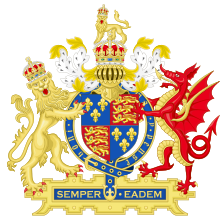Parliament of England
| Parliament of England | |
|---|---|

Royal coat of arms of England, 1558–1603
|
|
| Type | |
| Type |
Unicameral
(1215–1341 / 1649–1657) Bicameral (1341–1649 / 1657–1707)1 |
| Houses |
Upper house: House of Lords (1341–1649 / 1660–1707) House of Peers (1657–1660) Lower house: House of Commons (1341–1707) |
| History | |
| Established | 15 June 1215 (Lords only) 20 January 1265 (Lords and elected Commons) |
| Disbanded | 1 May 1707 |
| Preceded by | Curia Regis |
| Succeeded by | Parliament of Great Britain |
| Leadership | |
|
William Cowper1
Since 1705 |
|
|
John Smith1
Since 1705 |
|
| Elections | |
| Ennoblement by the Sovereign or inheritance of an English peerage | |
| First past the post with limited suffrage1 | |
| Meeting place | |
 |
|
| Palace of Westminster, Westminster, London | |
| Footnotes | |
|
1Reflecting Parliament as it stood in 1707. See also: Parliament of Scotland, Parliament of Ireland |
|
1Reflecting Parliament as it stood in 1707.
The Parliament of England was the legislature of the Kingdom of England. In 1066, William of Normandy introduced what, in later centuries, became referred to as a feudal system, by which he sought the advice of a council of tenants-in-chief (a person who held land) and ecclesiastics before making laws. In 1215, the tenants-in-chief secured Magna Carta from King John, which established that the king may not levy or collect any taxes (except the feudal taxes to which they were hitherto accustomed), save with the consent of his royal council, which gradually developed into a parliament.
Over the centuries, the English Parliament progressively limited the power of the English monarchy which arguably culminated in the English Civil War and the trial and execution of Charles I in 1649. After the restoration of the monarchy under Charles II, and the subsequent Glorious Revolution of 1688, the supremacy of Parliament was a settled principle and all future English and later British sovereigns were restricted to the role of constitutional monarchs with limited executive authority. The Act of Union 1707 merged the English Parliament with the Parliament of Scotland to form the Parliament of Great Britain. When the Parliament of Ireland was destroyed in 1801, its former members were merged into what was now called the Parliament of the United Kingdom.
...
Wikipedia
